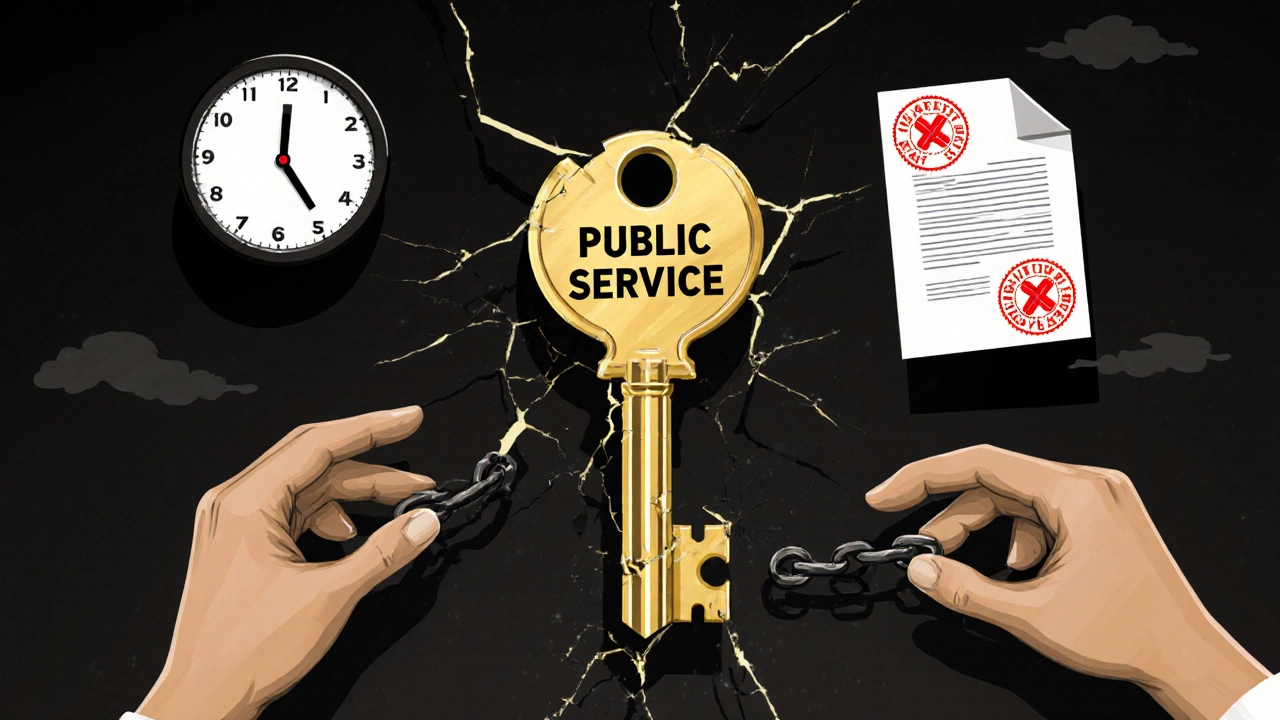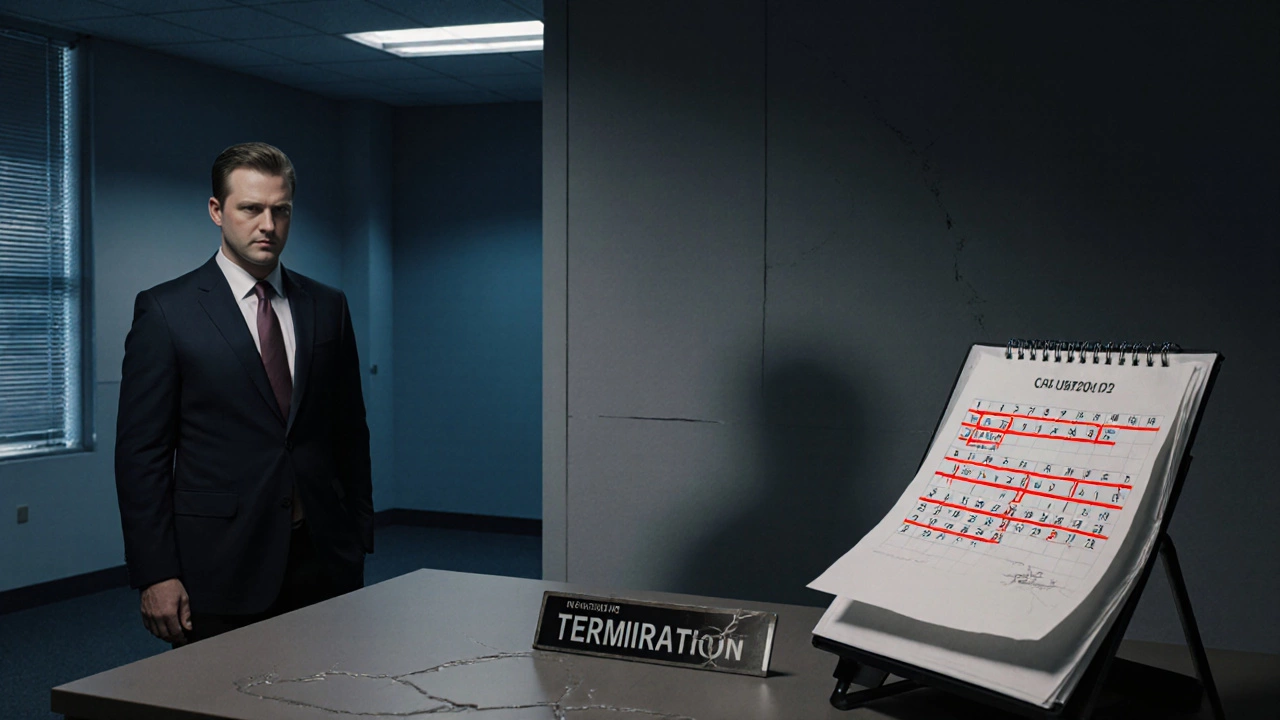Government Job Termination Risk Calculator
Risk Assessment Tool
This tool helps you understand your risk of termination based on government employment guidelines and procedures. Input your situation to get a personalized risk assessment.
People often think government jobs are forever. You pass the exam, get the badge, and that’s it-your job is locked in for life. But that’s not true. It’s not impossible to lose a government job. In fact, it happens more often than most people admit. The real question isn’t whether you can lose it-it’s how hard it is, and what it actually takes to get fired from a position most people assume is untouchable.
Government Jobs Aren’t Automatic Lifelong Contracts
There’s a myth that once you’re hired into a federal, state, or local government role, you’re safe no matter what. That’s not how it works. Government employees are protected by rules, not by magic. These rules exist to prevent arbitrary firings-like firing someone because their boss doesn’t like their haircut. But they don’t protect incompetence, dishonesty, or repeated violations.
Most civil service positions fall under merit-based systems. That means hiring and firing are governed by strict procedures. You can’t just be let go on a whim. But if you break the rules, skip work for months, lie on your application, or steal from the public trust, you can-and will-be removed. It’s not easy, but it’s not impossible either.
What Actually Gets You Fired?
Most government employees who lose their jobs don’t get fired for small mistakes. They get fired for serious, repeated, or intentional misconduct. Here are the top five reasons:
- Chronic absenteeism - Missing work without valid documentation for more than 10 days in a year, especially after warnings, triggers formal action.
- Fraud or falsification - Lying about qualifications on your application, faking credentials, or inflating your experience. This is a direct violation of civil service ethics.
- Insubordination - Refusing to follow lawful orders from supervisors, especially after multiple written warnings.
- Harassment or discrimination - Creating a hostile work environment through verbal abuse, threats, or bias-based behavior. Government agencies have zero tolerance for this.
- Criminal activity - Being convicted of a felony, especially one related to your duties (like embezzlement or bribery).
These aren’t theoretical risks. In 2023, the U.S. Office of Personnel Management reported over 12,000 federal employees were removed for misconduct. Most of them had received multiple warnings first. In New Zealand, the State Services Commission recorded 284 public service dismissals in 2024-most for performance or conduct issues.
The Process Is Slow, But It’s Real
Getting fired from a government job isn’t like being let go from a private company. There’s paperwork. There are hearings. There are appeals. It can take six months to over a year. But that doesn’t mean you’re safe.
Here’s the typical process:
- Performance or conduct issue is documented - Your supervisor writes up an incident. This isn’t a one-time thing. It’s a pattern.
- Formal warning issued - You get a written notice, often with a 30- to 90-day improvement plan.
- Review board evaluates - A panel of HR staff and union reps reviews your case. You’re allowed to respond.
- Decision made - If they decide termination is warranted, you get a notice of proposed removal.
- Appeal rights activated - You can appeal to a civil service tribunal or labor board. But appeals rarely overturn the decision if the evidence is solid.
Many people think the appeal process is a safety net. It’s not. It’s a legal formality. If your file shows repeated violations, the odds of winning an appeal are below 15%.

Union Protection Doesn’t Mean Immunity
Unionized government workers often believe their union will protect them no matter what. That’s not true. Unions fight for fair process, not for shielding bad behavior. They’ll make sure you get due process, but they won’t defend you if you stole office supplies, falsified time sheets, or bullied coworkers.
Unions step in when the process is broken-not when the person is guilty. If you’re being treated unfairly, they’ll help. If you’re clearly in the wrong, they’ll advise you to accept the outcome and move on.
What Happens After You’re Fired?
Getting fired from a government job doesn’t mean you’re blacklisted for life. But it does come with consequences:
- You lose your pension eligibility - If you haven’t worked long enough (usually 5+ years), you may forfeit retirement contributions.
- You can’t reapply for the same role - Most agencies ban fired employees from reapplying for 1-5 years.
- Your record follows you - Termination for misconduct is recorded in national civil service databases. Future employers can request this information.
- It hurts your reputation - In small government circles, word travels fast. A dismissal for fraud or harassment sticks.
Some people go on to work in the private sector. Others retrain and apply for lower-level government roles after the ban period ends. But you won’t get your old job back. And you won’t get a glowing reference.

How to Avoid Losing Your Job
If you’re in a government job-or planning to get one-here’s how to stay safe:
- Never lie on your application - Background checks are thorough. They verify degrees, work history, even references.
- Follow the rules, even the small ones - Dress code, punctuality, email etiquette. These aren’t just busywork. They’re indicators of professionalism.
- Document everything - Keep copies of emails, performance reviews, and warnings. If something goes wrong, you’ll need proof.
- Ask for help early - If you’re struggling with workload or behavior, talk to HR before it escalates.
- Respect the chain of command - Don’t go over your supervisor’s head unless you have a legitimate grievance.
The best government employees aren’t the ones who know the most. They’re the ones who show up, follow the rules, and treat people with respect.
It’s Not About Job Security-It’s About Responsibility
Government jobs aren’t about getting a free pass. They’re about serving the public. That comes with accountability. The system isn’t designed to protect bad employees-it’s designed to protect the public from bad employees.
If you’re honest, reliable, and professional, you’ll never have to worry about losing your job. But if you cut corners, ignore rules, or abuse your position, the system will catch up. It might take time. It might be slow. But it will happen.
Government work isn’t easy. But it’s not meant to be a lifetime safety net. It’s meant to be a public trust. And if you break that trust, you lose the job.
Can you get fired from a government job for being late?
Yes-if it’s frequent and documented. One or two late arrivals won’t get you fired. But if you’re consistently late without valid reasons, and you’ve been warned multiple times, it becomes a performance issue. After three formal warnings, termination is possible.
Do government employees get severance pay when fired?
Usually not-if you’re fired for misconduct. Severance is typically offered only in cases of redundancy or restructuring. If you’re dismissed for cause, you won’t receive any payout beyond accrued leave or unused vacation days.
Can you appeal a government job termination?
Yes. Most government systems allow appeals to a civil service commission or labor tribunal. But appeals succeed only if there’s a procedural error-like not being given a fair hearing or missing documentation. If the facts against you are clear, appeals rarely change the outcome.
Does getting fired from a government job affect your future job applications?
Yes. If you were fired for misconduct, that record is stored in national civil service databases. Future employers, especially in the public sector, can request your employment history. A dismissal for fraud, theft, or harassment will show up and hurt your chances.
Can you reapply for a government job after being fired?
It depends. If you were fired for minor issues like poor performance, you might be eligible to reapply after 1-2 years. But if you were fired for fraud, criminal behavior, or serious misconduct, you’re typically banned for 5 years or permanently, depending on the agency’s policy.

